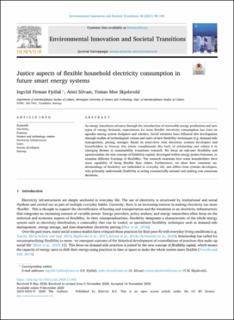| dc.contributor.author | Fjellså, Ingvild Firman | |
| dc.contributor.author | Silvast, Antti | |
| dc.contributor.author | Skjølsvold, Tomas Moe | |
| dc.date.accessioned | 2022-10-19T06:58:09Z | |
| dc.date.available | 2022-10-19T06:58:09Z | |
| dc.date.created | 2020-12-11T12:35:44Z | |
| dc.date.issued | 2021 | |
| dc.identifier.citation | Environmental Innovation and Societal Transitions. 2021, 38 98-109. | en_US |
| dc.identifier.issn | 2210-4224 | |
| dc.identifier.uri | https://hdl.handle.net/11250/3026879 | |
| dc.description.abstract | As energy transitions advance through the introduction of renewable energy production and new types of energy demands, expectations for more flexible electricity consumption has risen on agendas among system designers and scholars. Social scientists have followed this development through studies of technological visions and users of new flexibility techniques (e.g. demand-side management, pricing, storage). Based on interviews with electricity systems developers and householders in Norway this article complements this body of scholarship and relates it to emerging themes in sustainability transitions research. We focus on end-user flexibility and operationalize the new concept of flexibility capital, developed within energy justice literature, to examine different framings of flexibility. The research examines how some householders have more capability of being flexible than others. Furthermore, we show how consumer understandings of flexibility are embedded in everyday life, and differs from systems developers, who primarily understands flexibility as acting economically rational and making cost-conscious decisions. | en_US |
| dc.language.iso | eng | en_US |
| dc.publisher | Elsevier | en_US |
| dc.rights | Navngivelse 4.0 Internasjonal | * |
| dc.rights.uri | http://creativecommons.org/licenses/by/4.0/deed.no | * |
| dc.title | Justice aspects of flexible household electricity consumption in future smart energy systems | en_US |
| dc.type | Peer reviewed | en_US |
| dc.type | Journal article | en_US |
| dc.description.version | publishedVersion | en_US |
| dc.source.pagenumber | 98-109 | en_US |
| dc.source.volume | 38 | en_US |
| dc.source.journal | Environmental Innovation and Societal Transitions | en_US |
| dc.identifier.doi | 10.1016/j.eist.2020.11.002 | |
| dc.identifier.cristin | 1858720 | |
| dc.relation.project | Norges forskningsråd: 257626 | en_US |
| dc.relation.project | Norges forskningsråd: 296205 | en_US |
| cristin.ispublished | true | |
| cristin.fulltext | original | |
| cristin.qualitycode | 1 | |

